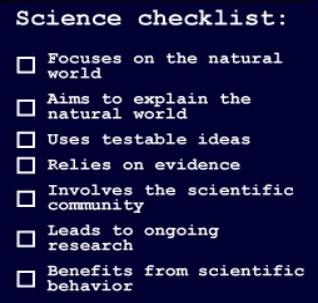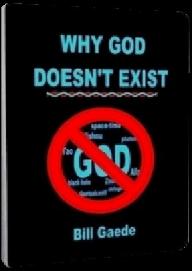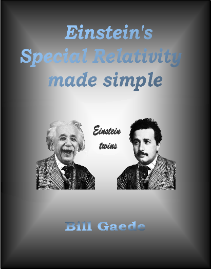| The Scientific Method |

- What is Science in the alternative?
If this is not what Science is about, then what is Science in the alternative?
Let's begin by defining the term at the center of our inquiry so that we're all on the same page...
- Science: rational explanations
- (We capitalize the word 'Science' to distinguish it from what the mathematical 'physicists' do.)
In Science, we only explain. We explain objectively and rationally. We do so not to persuade or to shove our
religion down somebody's throat. We explain so that the listener UNDERSTANDS our theory. The purpose of
Science is NOT to convince in order to recruit. The purpose of Science is to explain in order to understand.
The purpose of Science as it pertains to Physics is to learn a mechanism, to visualize a physical interpretation.
What people decide to believe after the presentation is over is their personal business and doesn't concern
Science. Belief and opinion are the hallmarks of religion.
People who were brainwashed to believe that 'science' is about observing, predicting, running experiments,
collecting data, presenting evidence, proving and arriving at the Truth, and developing gadgets (technology)
are bound to be offended by my words and will undoubtedly have lots of questions.
- What do you mean we don't make predictions?
Are you really proposing that Science do away with Mathematics and equations altogether?
- What is this nonsense you say that we don't do experiments or prove in 'science'?
How can you possibly make an absurd statement such as that Science has nothing to do with
Technology?
Yes! We don't make predictions. We don't use any Math or equations. We don't do experiments. And we don't
present evidence or prove or seek the Truth because we are not in the business of recruiting. It is the preacher
who attempts to impose his view on you in order to induct you into his religion. It is the politician who asks you to
vote for him and his platform. It is the calculating prosecutor who asks the juror to declare his version of the case
a fact.
And if Physics is about 'explaining mechanisms rationally', then in what way does Mathematics enter the picture?
Do we perchance need numbers or equations to explain how the brick broke the window and why the pieces of
glass are lying on the floor? Do we explain such phenomena with words such as energy or mass, or do we just
explain that a brick went through the window? Why would explaining how a magnet attracts another or what
physically caused a pen to fall to the floor rather than to the ceiling be any different? Aren't we talking about a
mechanism?
And developing gadgets is not a branch of Science. In Science, we ONLY explain in order to understand.
Here's the synthesis...
- Science: explanations Religion: opinions, beliefs
The proof is in the pudding
Now for the icing on the cake... The new generations of 'physicists' coming out of the universities openly state
that 'physics' is in a crisis. The new breeds realize that there is something wrong and that Mathematical 'physics'
is at a crossroads. They will either have to come up with ever more ghosts to explain the weird workings of the
Universe or shift the paradigm completely. Here are a couple of examples that should make you stop and
think that all is not well in contemporary 'science'.
..........Not even wrong ...
..........Why a Physics Revolution Might Be on Its Way ...
..........Crisis At The Foundations Of Physics ...
..........Have physicists made a terrible mistake? ...
There is clearly a crisis in the discipline that the mathematical 'physicists' call 'physics'. The crisis has to do with
the fact that after 400 years of Newtonian descriptions, the so-called 'physicists' are unable to explain the simplest
of phenomena. Not a single 'physicist' alive today can explain how a magnet attracts another or why (cause,
physical interpretation, mechanism) the Moon doesn't drift out of the Solar System. They never will because...
- 1. The mathematical 'physicists' don't believe that such issues are a part of science. They
dismiss qualitative explanations as 'philosophy' and philosophy is not a part of mathematical
'science'. They equate philosophy with opinion. The theoreticians equate 'science' with
description. They do so because Math is a descriptive language. Math has no power to explain.
2. The mathematical 'physicists' also spread a mantra that all of them memorize and that goes
something like this...
- "The mind of a cat is to the mind of a human like the mind of a human is to the mind
of God."
Thus, a cat is unable to understand things such as math or computers. Likewise, humans
cannot hope to understand the ways of God and how this Universe works. We can at best
try to learn eternally, make progress, but never attain full knowledge. Therefore, it is quite
arrogant of you to think that you can explain the workings of the Universe rationally. "Who
do you think you are? God?"
So there is no expectation that we can ever understand how this Universe works because
no one expects that humans can ever break the code.
3. The third reason the mathematical 'physicists' will never solve problems such as how one
magnet attracts another is that no one is investigating them. No one is researching this subject
that intrigued Faraday so much. No one cares any more about magnets because magnets
belong to the long gone age of Classical Mechanics (19th Century and before). More precisely,
as Richard Feynman lamented, "theoreticians have given up on that". Mathematical 'physicists'
are now beyond such petty topics. They are now into high level, university stuff such as
time travel and particles of mass.
4. The fourth reason they won't discover the secret is that the mechanics will never be able to
explain attraction from a distance with discrete particles. Anyone still proposing particles in the
21st Century will be steamrolled over by genuine physicists. There is no excuse for holding on to
irrational explanations merely to salvage the ancient and obsolete Particle Hypothesis at all costs.
5. The last bastion is those misguided souls who argue that computers wouldn't work if Quantum
were wrong or that GPS wouldn't work if Relativity were wrong. Do computers prove that a
as Relativity treats it?
The physical mechanisms that underlie magnetic, gravitational, light and atomic behavior are the Lion's Paw
tests of Physics. He who cannot explain these phenomena is not a physicist. It's just that simple. He has no
excuse because we now have rational physical interpretations for these observations. The inability of
the mathematical 'physicists' to explain how two simple magnets work is a categorical judgment on their
version of the Scientific Method. Traditional religions already had supernatural explanations for unseen agents
and phenomena (e.g., parting the seas, walking on water, Ascension). We didn't need Mathematical 'physics'
(black hole, many copies of you, time travel, dark matter, particle of mass) to replace the supernatural
explanations of traditional religions with yet more nonsense.
The mathematical 'physicists' may counter-argue that their theories are consistent with the Math.
It turns out that the proposals in this site are also consistent with the Math, yet in contrast to those of
Quantum Mechanics they are rational explanations. We can make a movie of the mechanisms because
they are all mediated by objects. The theories of Quantum Mechanics as well as those of General Relativity,
in contrast, are mediated by concepts (energy, mass, force, time, information...). In Physics, only objects
can be said to move. The home of a genuine physicist is with the Foundations of Physics.
- Science has nothing to do with knowledge
If you look up the word science in the dictionary or encyclopedia you will find the following definitions:
- "a systematic enterprise that builds and organizes knowledge in the form of testable
explanations and predictions about the universe" (Science - Wikipedia)
"systematic knowledge of the physical or material world gained through observation
and experimentation" (Science - dictionary.com)
These notions of science have been around at least since the days of Newton when researchers began
to question the wisdom of the Ancient Greek philosophers and mathematicians.
One fatal problem with the foregoing definitions is that no one has ever been able to define the word
knowledge. No one knows what they mean by know. This becomes patently obvious when we look at
two popular sources on the subject...
- "The attempt to analyze knowledge has received a considerable amount of attention
from epistemologists, particularly in the late 20th Century, but no analysis has been
widely accepted. Some contemporary epistemologists reject the assumption that
knowledge is susceptible to analysis." (Knowledge - The Stanford Encyclopedia of Philosophy)
"The definition of knowledge is a matter of ongoing debate among philosophers in the
field of epistemology. (Knowledge - Wikipedia)
"Knowledge, being a primitive fact of consciousness, cannot, strictly speaking, be defined...
The distinction between knowledge and belief is more difficult to draw... both belief and
knowledge imply certitude, and denote states of mental assurance of the truth." (Knowledge
- The Catholic Encyclopedia)
- The philosophers have been mucking about for over 2000 years and are still debating whether Plato's
justified true belief is the appropriate definition. Is that what knowledge is? A form of belief? If so, we
can easily replace the word knowledge with the word belief in foregoing definitions of science and see
what science means to the mathematical establishment...
- "a systematic enterprise that builds and organizes belief in the form of testable
explanations and predictions about the universe"
"systematic belief of the physical or material world gained through observation
and experimentation"
Is that what science is? A system of beliefs?
Science is not about describing
Let's begin with what science is not. Emeritus Professor Donald Simanek was taught and teaches that
science is about describing...
.........."Science doesn't explain; science describes."
So we describe a chair -- 4 legs, 1 seat and 1 backrest -- and we've done science? Is science about
measuring and stating that the speed of light is 300,000 km/sec? Is science reciting that the acceleration of
gravity is 9.8 m/sec²?
It should not surprise anyone that science was reduced to mere descriptions when you realize that the
mathematicians were the ones to gain control of the guild. Mathematics is ONLY a descriptive language.
Math can only describe. Math has no power to explain. It is thus that we have no explanations today for
simple phenomena such as how a magnet attracts another or why a pen falls to the floor instead of to the
ceiling.
The reason we ended up with no rational explanations is that the mathematicians concluded that 'science'
is about describing... specifically, their experiments... and with equations...
Science is not about running experiments
Berkeley University has devised a checklist to determine whether you're doing science:
- Is this what Science is about? Is it about running an experiment?
What if we run an experiment and don't understand what caused the results? What if we repeat the experiment a
million times and still don't understand what caused the results? Is this how we prove theories? By running
experiments and presenting evidence? Without a rational explanation of the mechanism? And to whom? To whom
did the theorist prove his theory? To God? To his peers at the Flat Earth Society? To a court of law? And what if
the jurors are ignorant? Or you mistakenly gave the talk at the local loony asylum? Does this qualify as proof?
And what if one juror is convinced and another one votes against the theory? Which of the two should we believe?
Let's face the facts. In Science, we do not prove theories. It is in religion where they prove and know and have
settled everything. In Science, we merely explain objectively so that the listener understands. In Physics, we
explain mechanisms.
Maybe it's just my impression, but it seems that the people who created this checklist are merely attempting
to induct you into their religion. What experiment can you carry out to elucidate the architectural nature of an
invisible entity? What is the purpose of evidence if not to persuade? And what is this talk about 'benefits' if
not to invent gadgets and devices? The people who created this checklist have not even managed to learn
that Technology has nothing whatsoever to do with Science.
- Science is not about proving the truth
More subtly, the Berkeley proselytizers casually introduce terms such as proof and truth. What else can be
the purpose of these strategic words if not to preempt you from challenging their conclusions? They are telling
you in your face that the matter has already been settled and you have no choice but to come up to speed on
what they have already confirmed through experiments and through a show of hands. This sleight of hand
summarily preempts you from raising objections. Your job is not to question what the scholars have proven.
Your job is to memorize their findings for the test and so that you don't look like a fool the next time you're at
a party. When a theoretician talks about proof and truth he is telling you that it's a done deal. You have nothing
to argue. All you are allowed to do is go to college, study Math, memorize the answers for the test, and, if you
are good little lad, "we promise that you'll have a career". You should not ask His Emeritus Eminence for an
explanation of a phenomenon. You should ask him for his autograph first and then for a job. Not even Popper's
falsifiability has a chance in such a one-way monologue.
Is science about presenting evidence and arriving at the truth? Whose truth? Yours or mine? What if you and
I arrive at different conclusions and opinions? Should we let our peers decide who's right through a show of
hands? Is this how Relativity and Quantum became Truth?
What Science is NOT
So let's quickly run through what Science is NOT. Scientists do NOT:
- 3. predict 11. persuade/convince/recruit
- 5. run experiments 13. win prizes
- 6. move concepts 14. censor
- 7. collect data 15. rely on authority
- 8. calculate 16. vote for theories
- It is the mathematicians who claim that these are elements of 'science'.

The scientist of the 20th Century: mathematical descriptions |
| The scientist of the 21st Century: rational explanations |
.
| To comment on any of the pages in this website go to: Rational Science |
A revolutionary paradigm shift...




